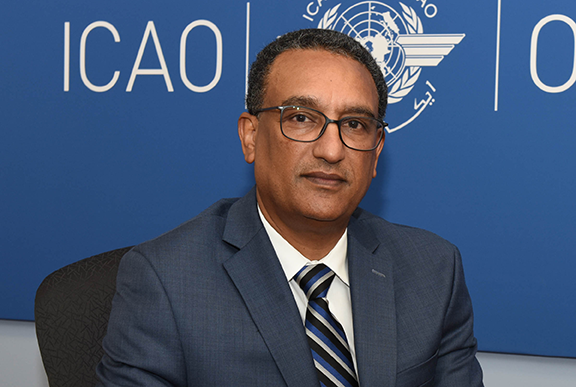Blog post
Leadership Spotlight: Meshesha Belayneh
 Meshesha Belayneh
Meshesha Belayneh
After completing his degree in mathematics and statistics, Meshesha Belayneh began his career working with the Ethiopian Road and Transport Authority. Within six months, he took on the role of Deputy Planning Head in his department and within the next eighteen months, was promoted to Acting Department Head. Belayneh has been working in the transportation industry ever since.
Today, Belayneh is both Deputy Director of ICAO’s Technical Cooperation Bureau and Chief of ICAO’s Global Aviation Training Office. Belayneh says the support and guidance he experienced from knowledgeable supervisors provided him with some key skills required for a future in leadership.
Over the span of his career, Belayneh has managed a variety of teams in both government and UN based organizations. “The experiences or challenges you have in a government institution and a UN agency are not the same. Having said that, what I have learned in the government institutions has helped me blend in with the UN system,” Belayneh says. Working in complex, multinational environments developed his resiliency and agility while bolstering Belayneh’s adaptive capacity to excel in this fast-paced industry. Having the ability to adapt in new environments is crucial to being an effective leader, but the experience gained from each new leadership position helps to shape and prepare leaders for future endeavours.
Understanding the human element
Leaders must recognize that every employee understands and communicates differently. “You have to know that you are working with human beings.” Belayneh says. “From time to time challenges will pop up and you have to know that there is some background to that. You have to be patient and look at issues from different angles.”
This is especially true in the context of a UN organization. People bring different cultures, backgrounds, and personalities to the table — and those differences shape how they think. However, Belayneh recognizes this is a unique environment that promotes diversity of thought that can actually improve the performance of the teams he is responsible for.
Belayneh says that a key element to ensuring all employees feel understood and represented in the workplace is to create cohesion amongst the team members and to use teamwork and communication to reinstate balance in the work environment.
Recognizing the value of the team
Early in his career, Belayneh learned to recognize the value that every employee brings to the organization. As a young employee and a new leader at the Ethiopian Road and Transport Authority, his supervisors would often include him in group brainstorming exercises to leverage his fresh perspective. “I’m grateful to those supervisors,” he says. “Sometimes when you’re young and you lack experience you propose drastic measures and your supervisors tell you ‘no, no, no that’s not how you do it.’”
These exercises not only provided an opportunity for Belayneh to learn from his supervisors and his highly experienced colleagues, but they also demonstrated how every employee’s input should be valued and respected. Some of the most improbable suggestions can lead to logical solutions. “You have to be a team player. Every one of the staff members you are working with is important,” Belayneh says. “I don’t underestimate the contribution of anyone.”
Each employee’s unique experiences influence the techniques they use in problem solving. In order to leverage the strengths of each team member, leaders need to understand that they can’t do it all, and that it’s okay to rely on the abilities of others. “I am very open about the fact that there are things I may not be able to do, but my colleagues can,” Belayneh says. “You have to work as a team.”
Placating supervisors is not a success strategy
There are eight airports in Ethiopia that hold exceptional importance for Belayneh. The building of these airports was a huge project, which held significant socioeconomic importance for the country, and it was under Belayneh’s leadership that this project came to fruition. “Whenever I travel to these places I feel I have fulfilled something,” he says. “I feel I have achieved something.” But Belayneh says success does not come from trying to please others.
Regardless of whether it is the construction of multiple international airports or the composition of a simple email, Belayneh says employees should aim to satisfy their own standards before anybody else’s. “I don’t do anything to appease a supervisor. I never did,” he says. “Give the best you can, convince yourself that this is the best you can do.”
The idea behind this method is that if employees choose to provide only what they believe is required they stifle their potential. If employees complete tasks to the best of their abilities, they are allowing for the opportunity to learn from the mistakes they make. “If that is the approach,” Belayneh says, “you will always be above the bar.”


